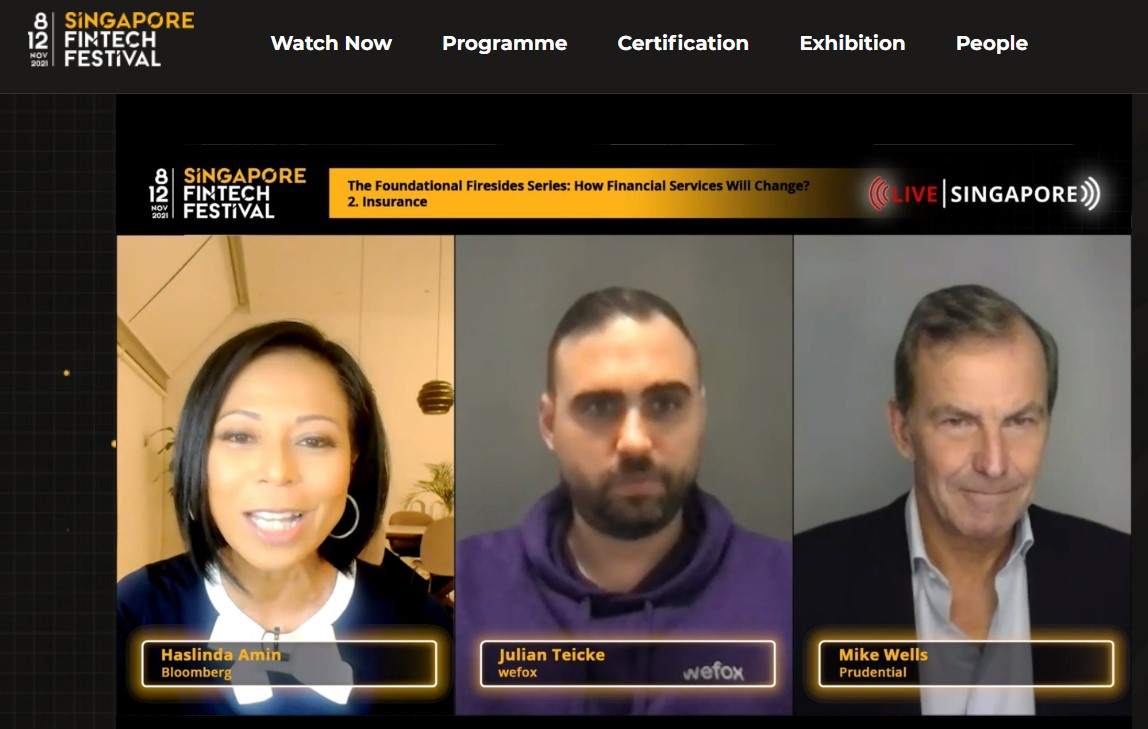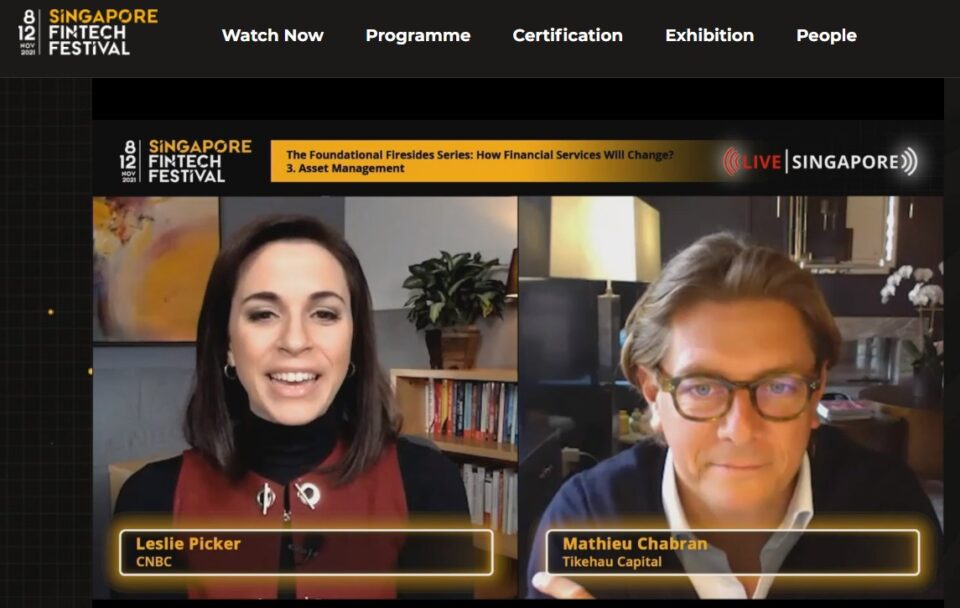This week sees the return of the Singapore FinTech Festival (SFF). Now in its 6th year, the festival is being broadcast to a global audience from 8 to 12 November 2021, as well as holding a number of in-person talks and sessions.
Laying claim to the title of the world’s largest FinTech event, this week provides a unique opportunity for the global FinTech, innovation and business communities to connect, collaborate and network.
The week-long SFF will feature more than 350 sessions, over 700 speakers, over 260 exhibitors, and 14 international pavilions. In terms of the virtual, global reach, this event will be streamed ‘live’ to over 60,000 participants, including representation from more than 7,000 companies, government agencies, educational institutions and organisations from over 130 countries.
All good events, especially Fintech ones, have a main theme, and the SFF is no different. SFF 2021 is focused on the topic of “Web 3.0 and its impact on financial services”. Web 3.0 involves the use of distributed ledger technology that will drive new decentralised infrastructures and business models in the digital economy. During the conference, global thought leaders will share their views on how Web 3.0 will shape new business models, and present new opportunities for building a sustainable future in financial services and the digital economy.
As Day One of the SFF has now come to a conclusion, let’s take a look at some of the major highlights from the first day of fintech activity Highlighting today’s best sessions
Highlighting today’s best sessions
The Battle for $250bn of Payments Revenues by 2030
This talk featured Ravi Patel, Head of Partnerships, Episode Six and Cyrus Daruwala, Managing Director – Financial Services & FinTech, IDC as speakers. The issue at hand was a recent report that, by 2030, 60% of global consumers will have made a transaction using a unit of value other than fiat currency, while 73% of global consumer payments will be processed by non-financial institutions on the Internet of Payments.
These forecasts, projected by market research firm IDC, reinforce the need for incumbent financial institutions to adapt their technology quickly for a market in which consumers expect more choice in terms of units of value as well as more tailored payments and credit propositions.
“The payments industry is undergoing a massive transformation: non-cash payment volumes are soaring, on-demand payments are gaining traction, and cloud computing and new technology have unleashed a wave of innovation, such as BNPL,” said John Mitchell, CEO of Episode Six. “This is creating a more level playing field for new entrants, and significant challenges for incumbents. The research we’ve unveiled today shows why financial institutions need technology that transfers any unit of value, as well as designed to be configurable and easily integrated into existing financial ecosystems, allowing our clients to bridge the old with the new.”
“Financial institutions and non-financial institutions are both vying for a key role in the ownership of payments,” said Cyrus Daruwala. “IDC forecasts that by 2030, 73% of consumer payments will be handled by non-FSIs through the Internet of Payments. Yet, FSIs are far from out of the payments game – they need to reshape the role they can play in payments of the future and the next-gen payments technology to succeed.”
The Foundational Firesides Series – How Financial Services Will Change?: 1. Capital Markets
Vikram Pandit, Chairman and Chief Executive Officer, The Orogen Group, hosted this talk, in order to ask the question: In a world where the finance industry is decentralising, how will the capital markets be moving in the next one to three years? From exchange rate, capital movement and monetary policy to financial services, this session discussed the current applications at play.
Vikram highlighted that the current state of capital markets “is where everything is centralised,” and explained that this was more of a reflection of ‘20th-century architecture, in contrast to the more decentralised nature of 21st-century markets. “Bringing those two things together and how we make markets better all around,” Vikram said “I think that’s the task ahead of us, for all of us, whether we’re regulators, whether we are practitioners, or whether we’re users of these capital markets.”
Key Global Trends: 3. Racing to Build the Next-gen Payments Infrastructure
Dr Patrick Njoroge, Governor, Central Bank of Kenya, and H.E. Serey Chea, Assistant Governor, National Bank of Cambodia engaged in an interesting discussion for their event. They explored topics such as public-private partnerships; Practical cross-border solutions to connect countries and regions; Blockchain and real-time payments; and the G20’s goals for speed, cost, access and transparency.
When it comes to public vs. private sector, H.E. Serey Chea explained that, in her opinion, there is no ‘right answer’: “I think if you already have a private sector that is already efficient, then you may just let it be. On the other hand, if you have a private sector that is fragmented, like the case of Cambodia, then you may need the public sector to [step] in.”
In addition to this, both Serey and Patrick agreed that a key goal is a collaboration between the public and private sectors, with Patrick pointing out that “We cannot do it alone. And so it means you need to be working closely with other like-minded institutions, central banks, from our perspective, I think there’s no going around that.”

Latest Company Announcements
Let’s have a look at some of the most interesting announcements by the companies in attendance at SFF 2021.
First up, The Monetary Authority of Singapore (MAS) and the Bangko Sentral ng Pilipinas (BSP) announced that they have signed an enhanced FinTech Cooperation Agreement (CA) to facilitate interoperable payments between Singapore and the Philippines. The enhanced CA builds on the earlier 2017 agreement to broaden the scope of FinTech collaboration and partnership between MAS and BSP.
The CA will facilitate the linkage of both countries’ real-time and QR payment systems, to provide instant, seamless and low-cost cross-border payments. This is a significant initiative given the sizeable remittance flows between Singapore and the Philippines, which totalled SGD 2.89bn in 2020.
Ravi Menon, Managing Director of MAS, said, “The enhancements to the MAS-BSP FinTech Cooperation Agreement will help fast track payments connectivity between Singapore and the Philippines. Critically, the linking of our QR and real-time payment systems also marks a concrete step towards the vision of an ASEAN network of interconnected real-time payment systems.”
Next, we had enteruptors announcing the launch of ‘PerformInABox’, a cloud solution which aims to optimise financial services, whether Web 3.0 or traditional. Transforming the “middle office” that is responsible for growing issues of risk, regulatory reporting, data governance, budgeting, and prudential management.
David Jordan, founder of enteruptors explained how a smarter middle office is key to finding higher margins and reducing the cost of trust in risk and regulation. He pointed out that today’s middle office is bloated and manually intensive, exposing institutions to cost, risk and errors. David also posed poses the question, “Why is a role so critical to risk and margin, dependent on spreadsheets, manual processes, disparate tools and dashboard software?”
enteruptors has received global recognition with New York-based Bank Automation News identifying it as one of 5 start-ups to watch for 2021.
Finally, we have the Fintech Job Report from the Centre for Finance, Technology and Entrepreneurship (CFTE).
CFTE analysed the 225 largest Fintech companies, representing $2.7T of market capitalisation, and identified 40,000 jobs offered by these companies. The research found that jobs in Fintech are much closer to jobs in tech companies rather than financial services, leading to the conclusion that “technology is eating finance” both in the innovation and recruitment trends. It also showed that Fintech provides an opportunity for many individuals to create, start, grow and pivot into the industry.
“A few years ago, the industry was wondering if banks should be tech companies or not. Our research shows that at least from an employment standpoint, Fintech companies are definitely tech, and not finance companies. This important finding should be taken into consideration by job seekers and students, but also banks and regulators.” Huy Nguyen Trieu, co-founder of Centre for Finance, Technology and Entrepreneurship.
Looking Ahead to the Rest of the Week
Monday saw an action-packed start to the Singapore Fintech Festival. The rest of the week, which will feature a mixture of in-person, remote, and hybrid sessions, promises to bring a lot to the table as well, with talks featuring a variety of speakers, including Vitalik Buterin and Mike Shinoda (of Linkin Park fame). Check back tomorrow for our full coverage of the day’s talks, announcements, and highlights.



